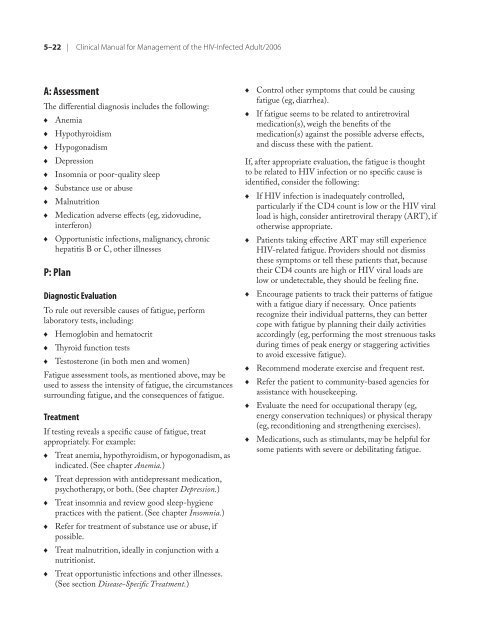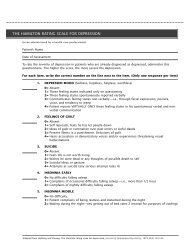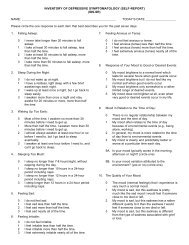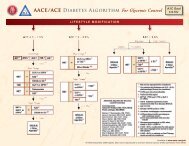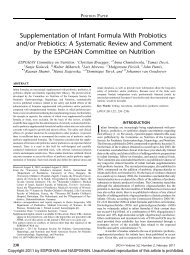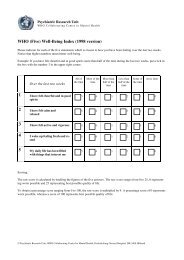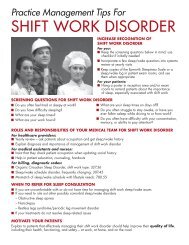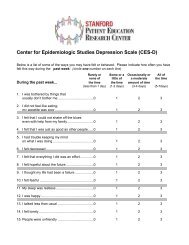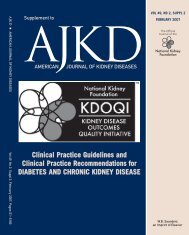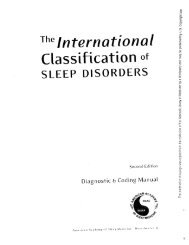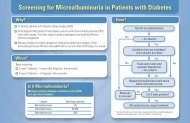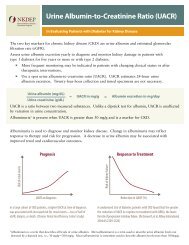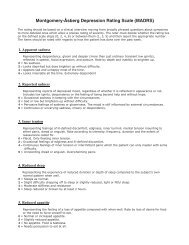Clinical Manual for Management of the HIV-Infected ... - myCME.com
Clinical Manual for Management of the HIV-Infected ... - myCME.com
Clinical Manual for Management of the HIV-Infected ... - myCME.com
Create successful ePaper yourself
Turn your PDF publications into a flip-book with our unique Google optimized e-Paper software.
5–22 | <strong>Clinical</strong> <strong>Manual</strong> <strong>for</strong> <strong>Management</strong> <strong>of</strong> <strong>the</strong> <strong>HIV</strong>-<strong>Infected</strong> Adult/2006<br />
A: Assessment<br />
The differential diagnosis includes <strong>the</strong> following:<br />
♦<br />
♦<br />
♦<br />
♦<br />
♦<br />
♦<br />
♦<br />
♦<br />
♦<br />
Anemia<br />
Hypothyroidism<br />
Hypogonadism<br />
Depression<br />
Insomnia or poor-quality sleep<br />
Substance use or abuse<br />
Malnutrition<br />
Medication adverse effects (eg, zidovudine,<br />
interferon)<br />
Opportunistic infections, malignancy, chronic<br />
hepatitis B or C, o<strong>the</strong>r illnesses<br />
P: Plan<br />
Diagnostic Evaluation<br />
To rule out reversible causes <strong>of</strong> fatigue, per<strong>for</strong>m<br />
laboratory tests, including:<br />
♦<br />
♦<br />
♦<br />
Hemoglobin and hematocrit<br />
Thyroid function tests<br />
Testosterone (in both men and women)<br />
Fatigue assessment tools, as mentioned above, may be<br />
used to assess <strong>the</strong> intensity <strong>of</strong> fatigue, <strong>the</strong> circumstances<br />
surrounding fatigue, and <strong>the</strong> consequences <strong>of</strong> fatigue.<br />
Treatment<br />
If testing reveals a specific cause <strong>of</strong> fatigue, treat<br />
appropriately. For example:<br />
♦<br />
♦<br />
♦<br />
♦<br />
♦<br />
♦<br />
Treat anemia, hypothyroidism, or hypogonadism, as<br />
indicated. (See chapter Anemia.)<br />
Treat depression with antidepressant medication,<br />
psycho<strong>the</strong>rapy, or both. (See chapter Depression.)<br />
Treat insomnia and review good sleep-hygiene<br />
practices with <strong>the</strong> patient. (See chapter Insomnia.)<br />
Refer <strong>for</strong> treatment <strong>of</strong> substance use or abuse, if<br />
possible.<br />
Treat malnutrition, ideally in conjunction with a<br />
nutritionist.<br />
Treat opportunistic infections and o<strong>the</strong>r illnesses.<br />
(See section Disease-Specific Treatment.)<br />
♦<br />
♦<br />
Control o<strong>the</strong>r symptoms that could be causing<br />
fatigue (eg, diarrhea).<br />
If fatigue seems to be related to antiretroviral<br />
medication(s), weigh <strong>the</strong> benefits <strong>of</strong> <strong>the</strong><br />
medication(s) against <strong>the</strong> possible adverse effects,<br />
and discuss <strong>the</strong>se with <strong>the</strong> patient.<br />
If, after appropriate evaluation, <strong>the</strong> fatigue is thought<br />
to be related to <strong>HIV</strong> infection or no specific cause is<br />
identified, consider <strong>the</strong> following:<br />
♦<br />
♦<br />
♦<br />
♦<br />
♦<br />
♦<br />
♦<br />
If <strong>HIV</strong> infection is inadequately controlled,<br />
particularly if <strong>the</strong> CD4 count is low or <strong>the</strong> <strong>HIV</strong> viral<br />
load is high, consider antiretroviral <strong>the</strong>rapy (ART), if<br />
o<strong>the</strong>rwise appropriate.<br />
Patients taking effective ART may still experience<br />
<strong>HIV</strong>-related fatigue. Providers should not dismiss<br />
<strong>the</strong>se symptoms or tell <strong>the</strong>se patients that, because<br />
<strong>the</strong>ir CD4 counts are high or <strong>HIV</strong> viral loads are<br />
low or undetectable, <strong>the</strong>y should be feeling fine.<br />
Encourage patients to track <strong>the</strong>ir patterns <strong>of</strong> fatigue<br />
with a fatigue diary if necessary. Once patients<br />
recognize <strong>the</strong>ir individual patterns, <strong>the</strong>y can better<br />
cope with fatigue by planning <strong>the</strong>ir daily activities<br />
accordingly (eg, per<strong>for</strong>ming <strong>the</strong> most strenuous tasks<br />
during times <strong>of</strong> peak energy or staggering activities<br />
to avoid excessive fatigue).<br />
Re<strong>com</strong>mend moderate exercise and frequent rest.<br />
Refer <strong>the</strong> patient to <strong>com</strong>munity-based agencies <strong>for</strong><br />
assistance with housekeeping.<br />
Evaluate <strong>the</strong> need <strong>for</strong> occupational <strong>the</strong>rapy (eg,<br />
energy conservation techniques) or physical <strong>the</strong>rapy<br />
(eg, reconditioning and streng<strong>the</strong>ning exercises).<br />
Medications, such as stimulants, may be helpful <strong>for</strong><br />
some patients with severe or debilitating fatigue.


